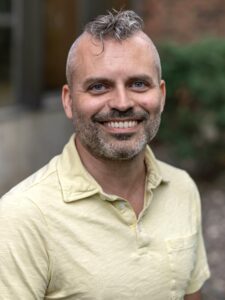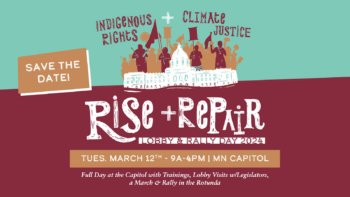 By Johan Baumeister
By Johan Baumeister
I am fond of spending time in canoes and on paddleboards, floating on the crisp waters of Minnesota. These waters reflect the natural beauty of our state and have long been gathering places. For countless generations, the waters of Mni Sota have been at the center of Dakota and Ojibwe lives, families, and communities.
The complex and often painful history of Minnesota is also reflected in these waters. I can’t do justice to the pain here; I can only acknowledge it.
“A deep understanding of local ecosystems and traditional land management techniques offer invaluable insights for sustainable resource management and conservation.”
Justice requires accountability that I cannot fully deliver. No one is responsible for actions they did not commit. But I can deliver my voice and my vote; I am accountable for those things. And as Scripture reminds us more than once, the truest reflection of God’s image calls us to repair those systems which are broken, to offer healing to those who need, and to lend our voice to calls for justice.
You might be scratching your head at this point, asking why the synod’s climate justice organizer is writing about Indigenous rights. That is a fair question and deserving of a good answer. We all know that colonization dispossessed Indigenous people of nearly the entirety of their traditional lands. These lands were often rich in biodiversity and crucial for environmental balance. Today, Indigenous communities are disproportionately impacted by climate and ecosystem changes.
And yet Indigenous knowledge and practices hold valuable solutions for climate mitigation and adaptation. A deep understanding of local ecosystems and traditional land management techniques offer invaluable insights for sustainable resource management and conservation.
Recognizing Indigenous rights to land, self-determination, and traditional knowledge is not only a matter of Indigenous justice; it is also essential for achieving a just and sustainable climate future for us all.
Who is in need of healing?
I believe that we are all in need of healing. All cultures and voices have intrinsic value and worth; one of the ways that historic oppression of Native Americans has harmed us is by suppressing culture and voice of First Nations peoples.
“Repair must be just.”
What has been lost is hard to quantify, and even harder to rebuild. I know from my own work that in learning more of Indigenous ways of knowing and ways of caring for the land, the environmental movement has benefitted from those voices. You can learn more about the process of healing and be invited into specific action by the ELCA’s Truth & Healing Movement.
How can we repair broken systems and lives?
Repair must be just. It needs to be as comprehensive as possible. And, most importantly, everyone must be represented at the table. Reservations were not created with the prosperity of their inhabitants in mind, nor were boarding schools built to preserve and honor Native culture. These systems were built around the perception that Indigenous people would be just fine, if they just weren’t so Indigenous.
So, instead of thinking of how to fix things for Indigenous communities, we can work with Indigenous communities to ensure future prosperity. I echo the 2022 Churchwide Assembly of the ELCA in its call to support creative efforts to restorative justice.
As the synod’s Congregational Organizer for Climate Justice, I know of one such opportunity here in Minnesota. Rise & Repair is an Indigenous-led coalition of climate justice and Indigenous rights groups. Check out its platform and 2024 legislation.
The EcoFaith Network has been a member of this coalition for two years now and we are eager to help equip Lutherans to faithfully express our shared values for justice. Please join me on Tuesday, March 11, at the State Capitol to rally for Rise & Repair and talk with your legislator about why it is important to you that they support Indigenous Rights and Climate Justice. (RSVP for Tuesday, March 11 event.


